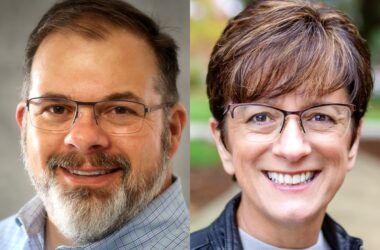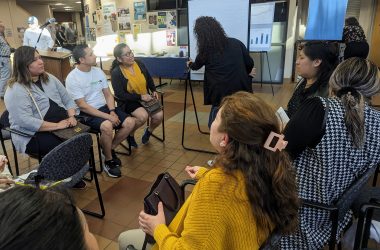Dozens of formerly homeless Salemites will soon get the keys to their own apartments in a new affordable housing complex in north Salem owned by the Salem Housing Authority and Enterprise Community partners.
At the grand opening of Sequoia Crossings on Tuesday, Jimmy Jones, executive director of the Mid-Willamette Valley Community Action Agency, invited assembled public officials, community partners and visitors to think of the tenants, many who spent years on Salem streets.
“Imagine,” he said, “that moment when you can close and lock a door, when you can lay in a warm bed with a roof over your head, when you could turn on a stove and cook your own meal. And you could sit down at a table with friends and family and have dinner in the safety and comfort of your own home.”
The apartment complex at 2950 Broadway St. N.E., which has 54 one-bedroom units and six two-bedroom units, gave priority to applicants who have been chronically homeless.
There will be at least one employee on site 24 hours a day to connect tenants with medical and dental care, addiction and behavioral health treatment, education, employment referrals and counseling, which are optional. The goal is to have a case manager and site assistant available at all times. The positions are funded by the state at $600,000 per year for the next 20 years, said Jessica Blakely, assistant housing administrator at the Salem Housing Authority.
Tenants will receive subsidized rent through housing vouchers or Permanent Supportive Housing rental assistance, with half coming from the housing authority and half from Oregon Department of Housing and Community Services.
Nicole Utz, housing administrator at the Salem Housing Authority, said the land was previously a 30-unit public housing project that “became distressed over its useful lifespan” and the buildings were demolished between 2009-2012.
Sequoia Crossings has been in the works since 2018, when the city budgeted almost $19 million for it, but the total cost rose to about $25 million by 2022.
In 2022, the Salem Housing Authority received $1.5 million in federal pandemic relief funding for the project, and the project also received about $9.4 million through the federal Low Income Housing Tax Credit Program, which offers tax credits to developers who build or acquire property to be used as low-income rental housing. Oregon Housing and Community Services funding contributed $7.7 million and City of Salem HOME funding contributed $1.6 million. The rest is paid for by about $2.4 million through Salem Housing Authority Deferred Development fee, and loans which will be repaid through rent.
The project comes around three years after Redwood Crossings, the city’s first permanent supportive housing project, opened to serve roughly 30 people with higher needs like drug addiction or those who have disabilities. It houses only single people, while Sequoia Crossing has space for families.
The waitlist for Sequoia Crossings opened on Aug. 19, 2023, and closed two weeks later. In that time 584 people applied, said Utz. Sixty households will move in over the coming weeks.
The housing authority and Mid-Willamette Valley Community Action Agency secured funding to pay for the first tenants’ security deposits and basic furniture, like a bed, dresser and table.
The agency is also inviting community members and groups to help put together customized baskets for tenants, by filling a sturdy laundry basket with essentials like cleaning supplies, food and shampoo. They’re hoping to personalize the baskets to the needs and interests of families. Anyone interested can call or text 971-398-5696 or email [email protected].
The site was designed with mental health, safety and security in mind, with a calming blue color pallet and well-lit, open community spaces.

Lucy Briseno, a program manager at the community action agency, grew up in public housing and gave input on the design. Per her suggestion, the windows facing walkways are narrow and higher up so people can’t see into the apartments, while still letting in natural light. The counters and appliances are durable to limit the amount of calls to maintenance, which she said can be traumatizing.
“I felt heard,” said Briseno. “I just have so much hope that this could change this community one family at a time. I just really feel like it validated my lived experience, my struggle with homelessness, it’s not in vain.”
Amenities include laundry, air conditioning and games in common areas like cornhole and ping pong. Lights around the roof can change colors for festive holidays, and community gatherings will be encouraged.
More dogs than people will be moving in, Blakely said, and the apartments have two dog obstacle courses for beginners and intermediates. They’re part fun, part function.
“We can bring dog trainers here, which will also help the community because sometimes when they come from the camps they don’t always have the best training. So kind of guiding them through that process, getting them spayed and neutered, getting them up to date with their vet,” she said.
Five apartments will be filled per week starting next week, giving tenants and organizers time to get people settled. The tenants who have been chosen have already been connected with case managers, Blakely said.
“As every person moves into here, it’s going to free up that transitional bed somewhere else,” she said.
During his speech at the celebration, Mayor Chris Hoy highlighted recent affordable housing projects and shelters throughout the city, including 52 affordable units at city-owned Yaquina Hall, 343 affordable apartments at the private development Mahonia Crossing, the 75-bed Navigation Center for chronically homeless people, and micro shelters.
“Places like Sequoia Crossings make all of those other services work. People are working toward, once they’re getting off the street, out of a tent, either into a micro shelter into our Navigation Center, ready for the next step. And Sequoia Crossings is that next step,” he said. “This place is going to save lives.”

Correction: Sequoia Crossings is owned in partnership between the Salem Housing Authority and Enterprise Community Partners, and is not owned by the City of Salem. Salem Reporter apologizes for the error.
Contact reporter Abbey McDonald: [email protected] or 503-575-1251.
SUPPORT OUR WORK – We depend on subscribers for resources to report on Salem with care and depth, fairness and accuracy. Subscribe today to get our daily newsletters and more. Click I want to subscribe!
Abbey McDonald joined the Salem Reporter in 2022. She previously worked as the business reporter at The Astorian, where she covered labor issues, health care and social services. A University of Oregon grad, she has also reported for the Malheur Enterprise, The News-Review and Willamette Week.









